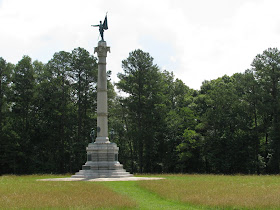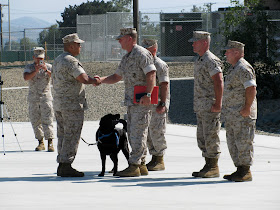No sweetening is enticing enough to endure the blistering hot one hundred degree battle field of Chickamauga just outside Chattanooga, but walking these places is what I set out to do. I was alone on this one. With the two youngsters ensconced at the Thomas Kincaidish Chanticleer Inn on Lookout Mountain, I set off for what I knew would be a sobering day.
Chickamauga was one of the bloodiest battles of the Civil War, more than 30,000 casualties. In a nutshell, the Union Army of the Cumberland with 60,000 men went against 65,000 men in the Confederate Army. The prize - for the North geographic access into Georgia and control of the rail lines, for the South protecting the Homeland that hadn’t seen action in its interior. On September 19-20, 1863, 125,000 men and countless cannons, rifles, infantry and cavalry went at each other, often hand to hand, stretching over a battle line of more than 4 miles. At times the fields were so littered, they could be crossed only by walking on fallen soldiers.

The battle site covering a huge area of fields and forests has been a national park since 1895. Even with the scorching heat and no water bottle, I set out to walk the areas I could, and drive the sections in between. The battle field holds 1400 monuments and markers, 600 put up for the various brigades and regiments for where they saw action. I was determined to check out as many as I could, and to walk those areas of action I knew about, like Longtreet's break through the Union line.
Some stand in the beauty of an open field,

others line the woods where soldiers did their best to put up some type of defense,


and the tallest of all for the state of Georgia.

A cannonball pyramid is erected wherever a commander fell, the higher up the officer the bigger his pyramid.

I climbed Wilder's monument honoring his legendary Lightening Brigade with their repeating Spencer rifles.

The view over the battlefield from Wilder's tower would have been bucolically beautiful if not for my mind's eye seeing the tens of thousands of young men killed and wounded across the landscape.

Overwhelmed by the heat and reality of the battle field, I finally found Snodgrass Hill where General George H. Thomas, the "Rock of Chickamauga", held off the Confederates while the Union Army retreated back to Chattanooga for a good siege. Yes, kids, the North lost this one.

In October of 1861, three brothers from Pendleton County enlisted in Kentucky 23rd Infantry, all in Company D. They were farmers, second generation German stock, two come from Pennsylvania with their mother and the third born in Kentucky. George Caseman at 33 years was old for a soldier, by now married with two young children but with Kentucky threatened by incursions from the Confederate Army, he enlisted in the Union Army. His 4 years younger brother, Jacob, was newly married with a young son, working on a farm. The youngest, Foster, was just 18 when the war broke out and he was the first to sign up with the 23rd. Who knows what Lydia felt when her three boys went off to war, all with the 23rd, Company D, the boys from Pendleton County, but I doubt it was much different from other mothers over the history of mankind's making war on each other.
The three young men fought with the 23rd into Chattanooga and from there to Chickamauga. Foster, age 20, was killed in action the first day of Chickamauga, on September 19, and is buried at the Chattanooga National Cemetery.
Jacob was wounded two weeks after the Battle at Chickamauga. The Union Army had retreated to Chattanooga and Jacob was accidentally shot by a drunken guard in the barracks, requiring amputation of his arm at the elbow.
He returned home to his family and farm and died ten years later at the age of 43.
Only George remained with the Kentucky 23rd whose boys endured the starving siege of Chattanooga and under General Grant made the ferocious charge up Missionary Hill, and followed Sherman on the march through Georgia to take Atlanta. He mustered out of the 23rd and returned home in early 1865. He had another six children and lived to an old age of 85.
George's first child, Mary Jane, born before he went off to war, is our great grandmother. George is our second great grandfather, and Jacob and Foster our uncles.
Every soldier on the field has a story, and a life, as rich as those of George and Jacob and Foster. That is the magnitude of it all.









